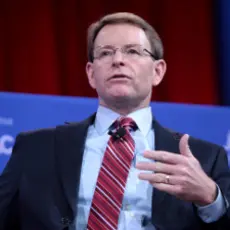I can't tell you how many times over the years I have been watching the Religious Right that they have threatened to bolt the Republican Party if the GOP doesn't fully embrace its cultural and political agenda. And then, every election season, the Right backs down and goes all-out to help elect Republican candidates to office.
Most people think that the GOP is already inexorably linked and fundamentally beholden to the movement, but apparently Religious Right leaders see it differently ... and from their perspective, if the GOP does't get its act together and start doing their bidding, then they are going to see their decade's long symbiosis soon come unraveled all together. That, at least, seems to be what Tony Perkins is telling Dan Gilgoff.
Apparently, the latest "last straw" stems from the fact that the RNC elected Michael Steele as its next chairman, with Perkins complaining that some of Steele's statements and positions are "less than encouraging" and proclaiming that "social conservatives are not going to be banging the door down to establish a relationship with the GOP. The party leadership is going to have to show a good-faith effort" to keep them in the fold:
[S]ocial conservatives are still committed to the issues and still involved in the political process, but don't see the GOP as the only means to affect things in this culture. And to the degree that the party is not moving with them, they are not going to move with it. There is not the strong connection to the Republican Party that there once was. I'm more representative of the younger generation and I don't have as strong allegiance to the Republican Party. And to the degree that they try to avoid the values issues and put them at the back of the bus, I don't have a lot of desire to mess around with that.
...
It's quite clear that the Republicans in the last few years have tried to move away from those issues and deemphasize those issues. You saw it in the presidential election, with more emphasis on religion and its role in the public square more from the Democratic Party than from the Republicans. I'm not saying it's genuine from the Democrats. It's yet to be seen. Obama has overturned the Mexico City Policy, a clearly pro-abortion move. But the Republicans can't just assume that because social conservatives are not supportive of Democrats means they'll support Republicans.
Gilgoff then asked Perkins just when the relationship went sour:
It is something that happened after 2004, when there was a great emphasis by the Republicans and the president on the need to protect marriage. It was used to secure a second term for President Bush and to expand Republican control of Congress. And after the election, the issue was basically dropped.
That, combined with corruption that distracted the Republican Party, Mark Foley—it all added up to where people began to scratch their heads and say, "This is not the party that is really reflecting our values."
Of course, we've had two national elections since then and, both times, the Religious Right has fully supported the GOP's candidates and pressed its grassroots activists into getting out the vote on their behalf.
So one has to ask just how much longer will the Right go on supporting a Republican Party that isn't "really reflecting our values"? Of course, the answer to that question is "forever" because they have nowhere else to go. They know it, the GOP knows it, and so does everyone else who pays attention to these sorts of things.





